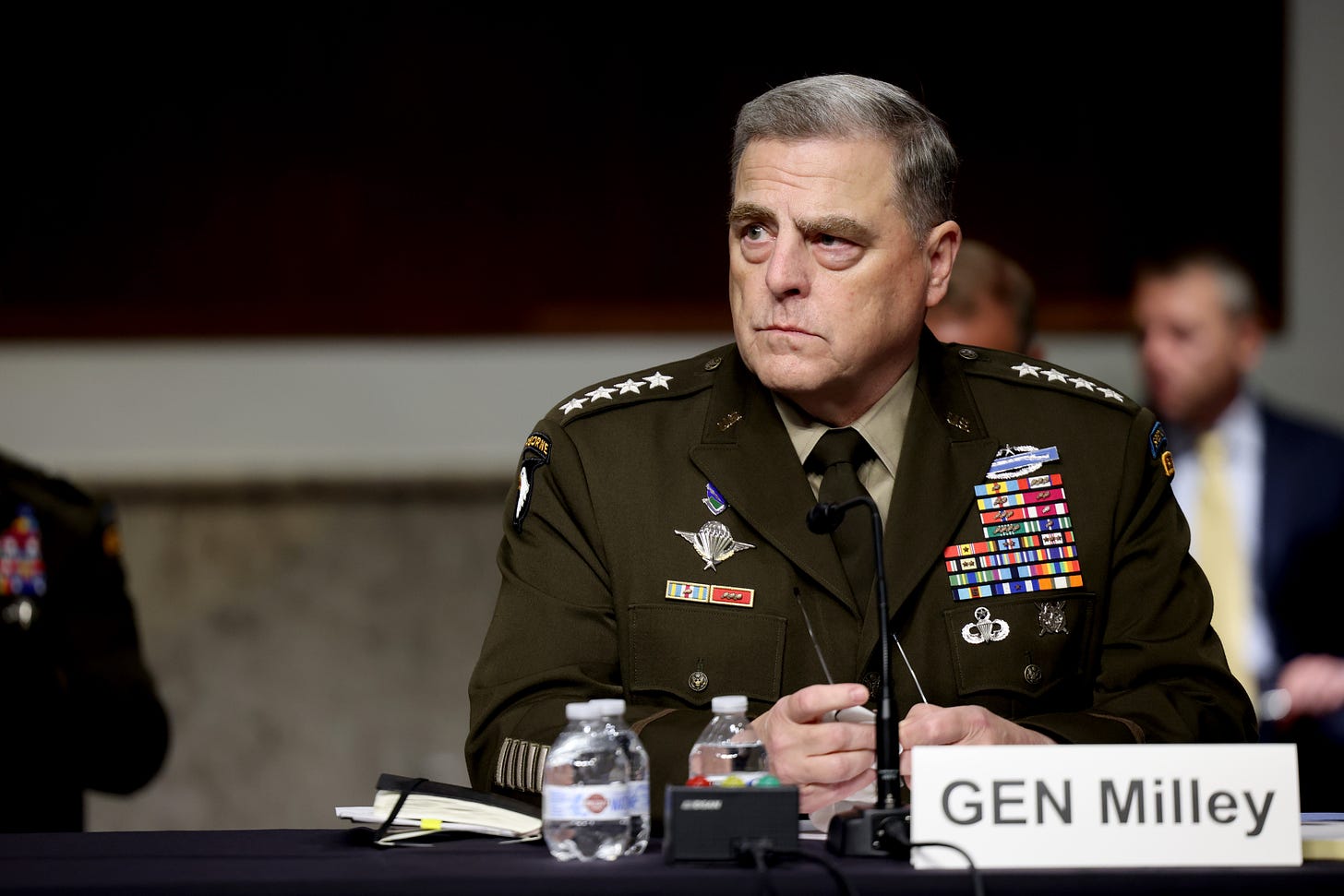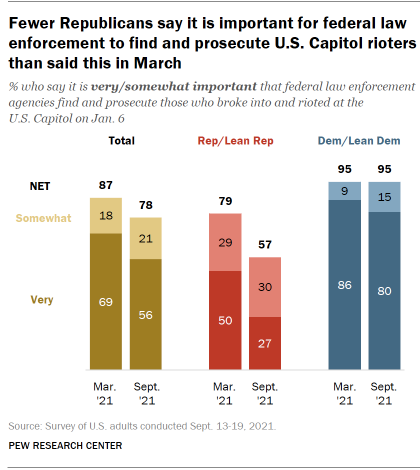(GettyImages)
Random takes from the Senate’s grilling of the nation’s top brass.
1. Finally, some hard truths after decades of spin and happy talk.
“It was a logistical success but a strategic failure,” General Mark Milley said….
[Defense Secretary Lloyd] Austin, a former four-star Army general who served in Afghanistan, conceded that the collapse of the Afghan army in the final weeks of the war — in many cases without firing a shot — took top commanders by surprise.
“We need to consider some uncomfortable truths: that we did not fully comprehend the depth of corruption and poor leadership in their senior ranks, that we didn’t grasp the damaging effect of frequent and unexplained rotations by President Ghani of his commanders, that we did not anticipate the snowball effect caused by the deals that the Taliban commanders struck with local leaders….
“We failed to fully grasp that there was only so much for which — and for whom — many of the Afghan forces would fight,” Mr. Austin said.
**
2. The hearings were a master class in civilian-military relations.
In full performative mode, Tom Cotton thought he had a powerful gotcha question for General Milley. Instead, it created an opening for one of the most memorable moments of the day.
Cotton, who previously served in the U.S. Army, demanded to know why Milley hadn't resigned after his recommendations were rejected.
Milley explained that isn't the way military service works.
"Senator, as a senior military officer, resigning is a really serious thing," said Milley, the chairman of the Joint Chiefs of Staff. "It's a political act if I'm resigning in protest. My job is to provide legal advice or the best military advice to the president. That's my legal requirement. That's what the law is. The president doesn't have to agree with that advice. He doesn't have to make those decisions just because we're generals."
Milley explained that were he to resign just because President Joe Biden didn't take his advice, "It would be an incredible act of political defiance for a commissioned officer to just resign."
"This country doesn't want generals figuring out what orders we're going to accept and do or not," Milley continued. "That's not our job. It's critical. My dad didn't get a choice to resign at Iwo Jima. They can't resign, so I'm not going to resign.
WATCH:

**
3. Imagine if the polarities had been reversed.
Republicans on the Senate Armed Services Committee didn’t just give a dressing down to the nation’s top soldier about the Afghanistan pullout; they assassinated his character and impugned his patriotism, accusing him of aiding the enemy and of placing his own vanity before the lives of the men and women serving under him.
It’s moments like these when my struggles against deep cynicism seem particularly futile. As we watched the fustian and fury of GOP senators and the defensiveness of (at least some) Democrats, it was hard not to imagine how their posings would have been inverted if Trump rather than Biden had presided over the fiasco.
And facts are awkward things for TrumpWorld.
**
4. Trump has a history problem.
Two top US generals testified before Congress on Tuesday that the Trump administration's deal with the Taliban affected the morale and performance of Afghan forces.
Gen. Mark Milley…said that the Doha agreement "did affect the morale of the Afghan security forces."
Commander of US Central Command Gen. Kenneth McKenzie, the top US general in the Middle East, went further, saying that the agreement with the Taliban signed in February 2020 "did negatively affect the performance of the Afghan forces in particular by some of the actions the government of Afghanistan was required to take as part of that agreement."
Secretary of Defense Lloyd Austin also said in the same hearing that the Doha agreement "severely impacted the morale of the military."

But his successor also had some awkward moments.
**
5. Biden has a credibility problem.
Top generals told lawmakers under oath on Tuesday that they advised President Joe Biden early this year to keep several thousand troops in Afghanistan — directly contradicting the president’s comments in August that no one warned him not to withdraw troops from the country.

UPDATE on D.C’s game of chicken.
Tuesday was the day it became clear either:
A) President JOE BIDEN’s legislative agenda is about to implode
or
B) Biden made serious progress toward a deal to salvage his agenda.
The public evidence points to option A.
Meanwhile, Bernie weighs in. (And so do we.)




And on the debt ceiling —>

Fiona Hill’s must read.
Really take some time with this: “How Putin Exploits American Dysfunction and Fuels American Decline.”
At times, the similarities between Trump and Putin were glaringly obvious: their shared manipulation and exploitation of the domestic media, their appeals to their own versions of their countries’ “golden age,” their compilation of personal lists of “national heroes” to appeal to their voters’ nostalgia and conservatism—and their attendant compilation of personal lists of enemies to do the same for their voters’ darker sides.
Putin put statues of Soviet-era figures back on their pedestals and restored Soviet memorials that had been toppled under Gorbachev and Yeltsin. Trump tried to prevent the removal of statues of Confederate leaders and the renaming of American military bases honoring Confederate generals.
The two men also shared many of the same enemies: cosmopolitan, liberal elites; the American financier, philanthropist, and open society promoter George Soros; and anyone trying to expand voting rights, improve electoral systems, or cast a harsh light on corruption in their countries’ respective executive branches.
GOP base cools on law and order.
Among key findings:
•There has been a 22 percentage-point drop since March in the share of Republicans who think it is very or somewhat important that federal law enforcement agencies find and prosecute those who broke into and rioted at the U.S. Capitol on Jan. 6 (from 79% to 57%). Moreover, only about a quarter of Republicans (27%) view prosecution of the rioters as very important; half said this was very important six months ago. Among Democrats and Democratic leaners, there have been only modest changes in opinions about finding and prosecuting the rioters. Today, 95% say it is important, including 80% who see this as very important.
Quick Hits
1. The Haitian Migrant Crisis Isn’t Over
Linda Chavez in today’s Bulwark:
According to a paper by the Migration Policy Institute, Haitian immigrants are more likely than other immigrants to become U.S. citizens and be in the labor force, and they are more likely than other Caribbean immigrants to speak English well. The overwhelming majority of Haitian immigrants (79 percent) have at least a high school degree and 19 percent have a college degree. While their median household earnings are somewhat lower than native-born Americans, $53,800 compared with $62,300 in 2018, they are far from poverty-stricken. Indeed, poverty rates for Haitian immigrants (14 percent) is roughly the same as for the native born and substantially lower than blacks overall (19.5 percent).
If we were to adopt a more humane policy in our treatment of Haitians and others fleeing instability and poverty in their own country, we could not only benefit those who want to come here but also boost the U.S. economy. We will not fully recover from the devastation the pandemic has wrought without expanding our labor force. Yet neither the administration nor Congress has been willing to prioritize immigration reform as a major component of economic recovery.
2. Coward Trump Didn’t Defend ‘Replacement Theory’?
Ben Parker has some questions. SATIRE WARNING.
Now that Tucker Carlson and our other most trusted sources of news and opinion are telling us that “replacement theory” is the real deal—i.e., that rootless, cosmopolitan Democrats are trying to replace light-skinned Americans with dark-skinned immigrants—I’m so disappointed to learn that Donald Trump totally cucked out over the white-nationalist replacement-theory proponents at the Charlottesville rally.
Cheap Shots
Now they tell us.


Perfectly normal.







Pompeo is a snake. When the book, Peril, came out he lambasted Gen. Milley along with Trump world even though he was trusted in the Milley and Esper circle. Now I can’t find record of it but I heard the whole interview weeks ago and it was full Maga against Milley. Now, after, yesterday, he is playing the careful wordplay game. This man is a competent Trump. He is not to be trusted with a bag of groceries.
I am glad that so many people have pointed out Peter Baker's misleading strip quote of the Stephanopoulos interview. My question to you, Charlie: how do we make sure that those sorts of strategically bad edits (designed to push a story line) don't take flight? Even you were misled enough to include it in your newsletter.
Also, listening to your podcast with Amanda Carpenter led me to want to push back on one other thing: there's no way that the progressives should approve the infrastructure bill until Sinema puts her cards on the table. Manchin is a known quantity, and the bought-and-paid-for Mark Penn dissidents in the House have played their cards, and while some of the most appealing parts of the reconciliation bill (drug negotiation and tax increases) will have to be scaled back way more than I would like to get their votes, it's at least a rational negotiation with them where the progressives can feel somewhat confident that there won't be a full-fledged reneging on the deal. Sinema, on the other hand, can't be trusted in my view unless and until she's signed in blood -- and even then I'm not sure. So even though it's counterintuitive, I think that you and Amanda are wrong and that the infrastructure bill has to be held hostage until she shows her cards. (see, e.g., the Ro Khanna interview on AC360 last night).